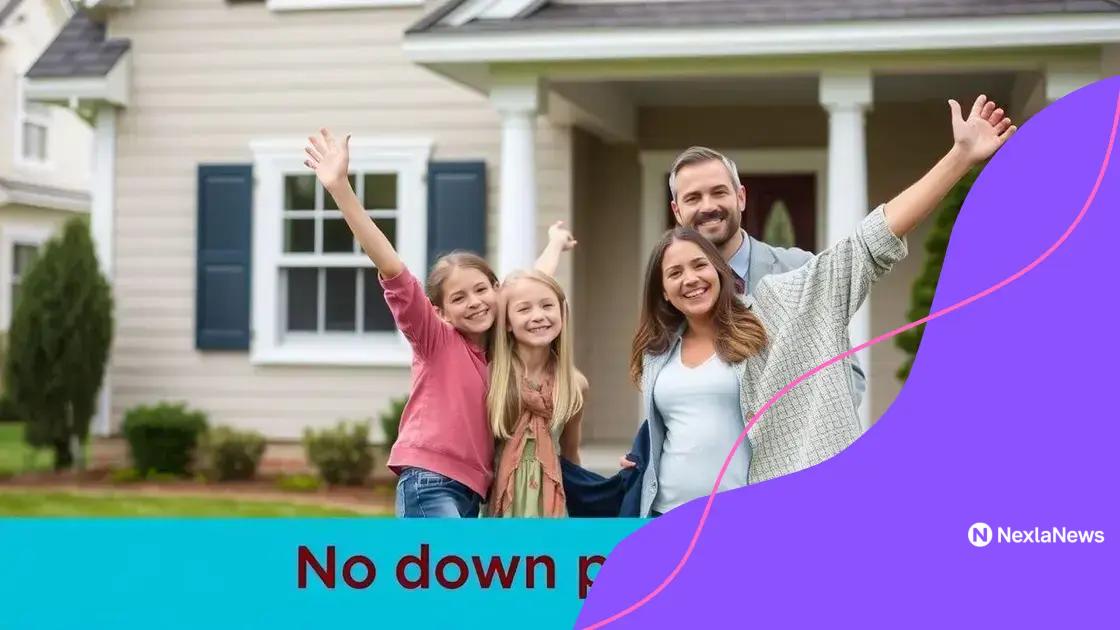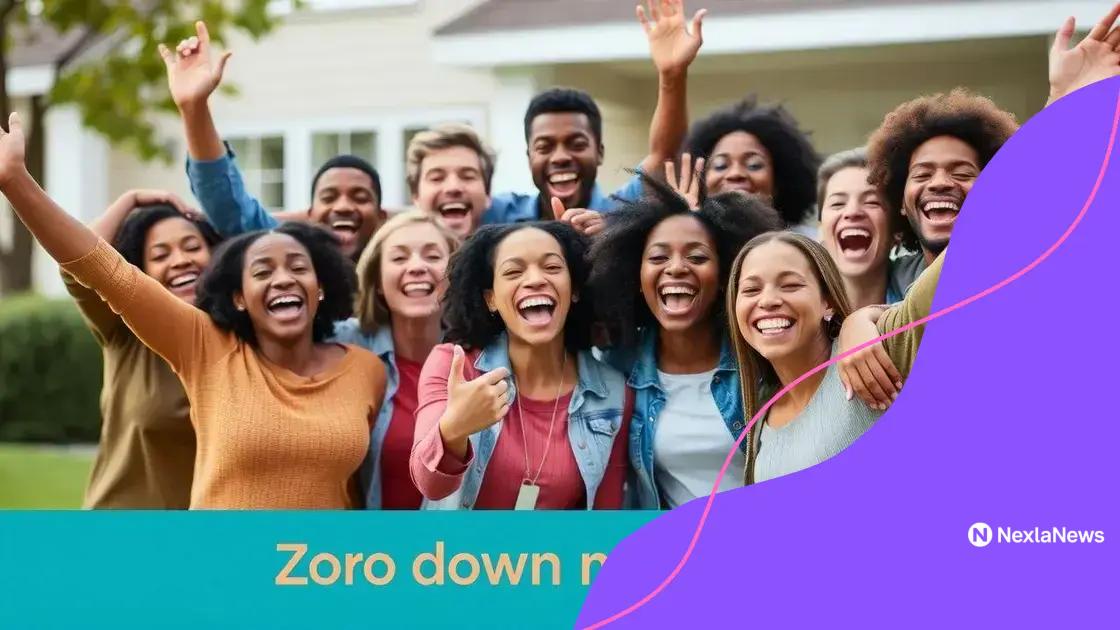Zero Down Mortgage: Unlocking Homeownership Dreams

A zero down mortgage allows homebuyers to purchase a home without a down payment, providing opportunities for those who may struggle to save large amounts while offering various eligibility and financing options.
Zero down mortgage options are changing the game for potential homeowners. Have you ever wondered if you can buy a home without a hefty down payment? This guide will open doors to understanding this unique financing solution.
What is a zero down mortgage?
A zero down mortgage is a type of home loan that allows buyers to purchase a home without making a down payment. This financing option is especially beneficial for those who may struggle to save for a traditional down payment. It opens doors to homeownership for many who might otherwise be unable to buy a house.
Understanding how a zero down mortgage works is crucial. Instead of requiring upfront cash, these loans typically roll the closing costs into the mortgage. This means that the borrower can finance the entire purchase price of the home. However, it’s important to note that monthly payments may be higher since you’re borrowing the total amount.
Benefits of a zero down mortgage
There are several benefits to consider when looking at a zero down mortgage:
- Increased accessibility for first-time homebuyers.
- Less financial strain since no large initial payment is required.
- The ability to invest savings in other important areas, like home improvements.
Additionally, many people find that a zero down mortgage allows them to become homeowners sooner rather than later. This can be a critical factor in today’s real estate market.
Who can qualify?
Typically, zero down mortgages are available to specific borrowers, including veterans or those using certain government programs. These programs often assess the borrower’s financial situation, credit score, and other factors to determine eligibility. Meeting the criteria for a zero down mortgage can set you on the path to owning your dream home.
Furthermore, understanding the requirements will help you gauge your readiness to apply for this type of financing. As you explore options, remember that it’s essential to consult with a mortgage professional to find the best fit for your needs.
Eligibility criteria for zero down mortgage
When exploring a zero down mortgage, it’s essential to understand the eligibility criteria. These requirements ensure that the loan is given to those who can manage it responsibly while supporting the goals of homeownership. Several factors play a crucial role in determining who qualifies for this type of loan.
One of the primary factors is credit score. Most lenders require a minimum credit score, often around 620, to qualify for a zero down mortgage. A higher credit score can enhance your chances and may even give you access to better rates.
Income requirements
Your income also significantly influences your eligibility. Lenders typically look at your debt-to-income ratio, which compares your monthly debt payments to your gross monthly income. A lower ratio is favorable and indicates that you can manage more debt. To qualify for a zero down mortgage, most lenders prefer a debt-to-income ratio of 43% or lower.
- Steady employment history is preferred.
- Self-employed individuals may need to provide additional documentation.
- Proof of income can include pay stubs, tax returns, or bank statements.
Additionally, certain loan programs, such as VA loans or USDA loans, have their specific requirements. These programs often prioritize first-time homebuyers or those purchasing in rural areas. Understanding these additional criteria can provide alternatives for individuals who may otherwise feel overwhelmed by the home-buying process.
Property requirements
The type of property you’re looking to buy also matters. Some lenders have specific criteria that the property must meet for a zero down mortgage. For example, properties must typically be primary residences, meaning they cannot be used for investment purposes.
In conclusion, ensuring you meet the various eligibility criteria for a zero down mortgage is key to unlocking homeownership. Keeping track of your credit score, income, and the property you wish to purchase will enhance your chances of being approved.
Benefits of zero down mortgages

The benefits of zero down mortgages are highly appealing, especially for first-time homebuyers. This financing option allows potential homeowners to enter the real estate market without needing a substantial down payment. It can be a game-changer for many individuals and families trying to realize their dream of homeownership.
One of the main advantages is the opportunity for faster homeownership. Without the burden of saving for a down payment, buyers can act quickly in today’s competitive market. This timing can be crucial when desirable properties arise.
Financial flexibility
Zero down mortgages also provide significant financial flexibility. By not having to allocate funds for a down payment, buyers can put those savings toward other expenses or investments. This could include renovations, moving costs, or even emergency funds. Having this extra capital can ease the financial strain that often comes with purchasing a home.
- Reduces the upfront costs of buying a home.
- Enables investment in home improvements right away.
- Helps maintain liquidity for unexpected expenses.
An additional benefit is the access to various loan programs specifically designed for zero down mortgages. Programs like VA and USDA loans cater to specific groups, making this option even more attainable. These specialized loans often come with low interest rates and favorable terms, further enhancing affordability.
Inclusivity for diverse buyers
Moreover, zero down mortgages promote inclusivity in the housing market. They help individuals who may struggle to save enough for a traditional down payment, such as recent college graduates or those in lower-income brackets. This increase in accessibility can contribute to more diverse neighborhoods.
In summary, the benefits of surviving without a down payment can open many doors in the housing market. By understanding these advantages, potential buyers can make informed decisions and take advantage of the opportunities that a zero down mortgage presents.
Common misconceptions about zero down mortgages
Many people have questions and concerns about zero down mortgages, leading to several misconceptions. Understanding the facts can help potential buyers make informed decisions about their borrowing options. One common myth is that a zero down mortgage means higher overall costs. While there can be higher monthly payments, it does not always translate to higher total costs over the life of the loan.
Another misconception is that zero down mortgages are only available to specific groups of people. In reality, while some programs may target veterans or rural buyers, there are many lending options available for various income levels and backgrounds.
Eligibility requirements
Many believe that qualifying for a zero down mortgage is extremely difficult. However, eligibility often depends on income and credit scores rather than having significant savings. Additionally, different lenders have varying criteria, making it essential to research available options.
- Some assume this option is only for first-time buyers, but experienced buyers can benefit too.
- Others think they need perfect credit, but many lenders accommodate different credit score levels.
- A misconception exists that this type of mortgage has fewer lending protections, but many federal programs offer strong consumer protection.
Furthermore, many believe that a zero down mortgage can lead to negative equity. While it can happen, just like with any mortgage, the real estate market fluctuates. Home prices can rise, providing equity over time, even without a cash investment upfront.
Closing costs
Another myth surrounding zero down mortgages is that there are no other costs involved. While you might not pay a down payment, closing costs still apply. Buyers should budget for these expenses to avoid unexpected financial strain. Overall, understanding these common misconceptions can empower buyers to explore their options fully.
Steps to obtain a zero down mortgage
Obtaining a zero down mortgage involves several key steps that can guide you through the process smoothly. Knowing these steps can help you feel more confident as you navigate the home-buying journey. First, you should assess your financial situation. This includes understanding your credit score and income level, which are crucial for qualifying.
Next, it’s wise to research the types of zero down mortgage options available. Various programs cater to different needs, such as VA loans for veterans or USDA loans for eligible rural properties. Identifying the right program for your situation is essential for success.
Pre-approval process
After you have done your research, the next step is to get pre-approved for a mortgage. This step involves submitting required documents to lenders, which may include:
- Proof of income (pay stubs, tax returns)
- Bank statements
- Identification documents
Getting pre-approved will give you a better understanding of how much you can borrow and show sellers that you are a serious buyer. This can set you apart in a competitive real estate market.
Finding a property
Once pre-approved, it’s time to start searching for your new home. Look for properties that meet your needs and fall within your budget. Remember, the type of property may impact your ability to use a zero down mortgage, as some loans require the home to be your primary residence.
As you make offers, be sure to work closely with your real estate agent, who can help you navigate this process. After your offer is accepted, you will need to arrange for an appraisal and home inspection. These steps are crucial to ensure you are making a sound investment.
Finalizing the mortgage
The final step is to close on your zero down mortgage. During closing, you will review all paperwork related to your mortgage, sign the necessary documents, and pay any closing costs not covered by the loan. It’s important to ask questions and clarify any concerns before you finalize the agreement.
By following these steps, you can successfully navigate the process of obtaining a zero down mortgage and move one step closer to homeownership.
In conclusion, a zero down mortgage can be a fantastic opportunity for many individuals and families looking to buy a home. By understanding the eligibility requirements, benefits, and common misconceptions, potential buyers can make informed decisions. The steps to obtaining such a mortgage, from assessing finances to finalizing the loan, are important to follow. Remember, entering homeownership doesn’t have to feel daunting; with the right knowledge and approach, you can unlock the door to your dream home!
FAQ – Frequently Asked Questions about Zero Down Mortgages
What is a zero down mortgage?
A zero down mortgage is a home loan that allows the buyer to purchase a home without making a down payment.
Who is eligible for a zero down mortgage?
Eligibility can vary, but typically includes first-time homebuyers, veterans, or qualified rural property buyers.
What are the benefits of a zero down mortgage?
Benefits include faster access to homeownership, increased financial flexibility, and access to various loan programs.
What steps do I need to take to obtain a zero down mortgage?
You should assess your finances, research options, get pre-approved, find a property, and then close the loan.
